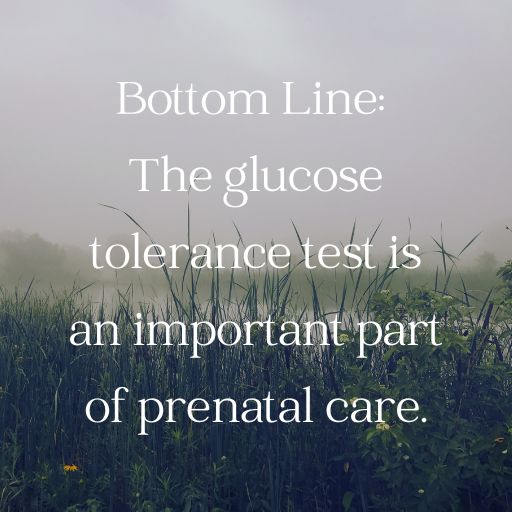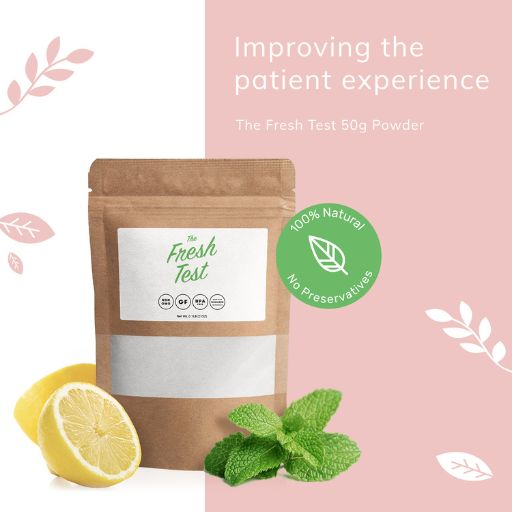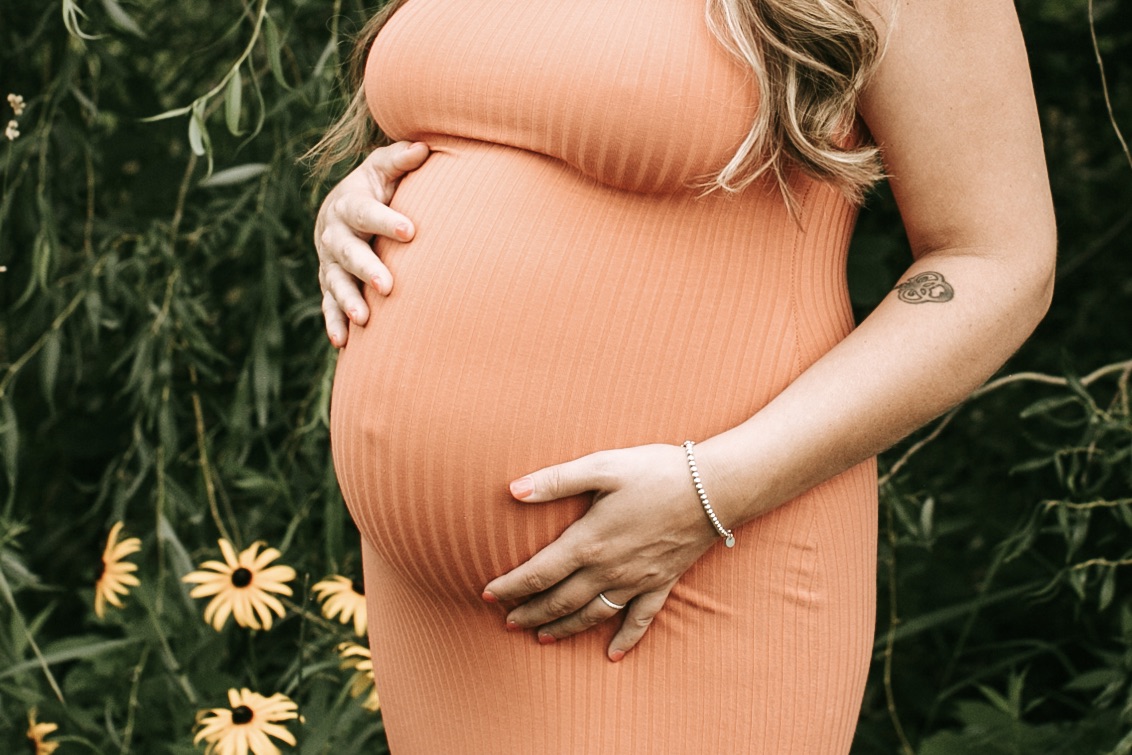How to Pass the Glucose Tolerance Test During Pregnancy (2023)
The glucose tolerance test often brings mixed emotions of curiosity and anxiety. I’m here to ease a bit of your worries.
This information is for educational purposes only and should not substitute the advice from your healthcare professional. This post may include affiliate links. That means if you click and make a purchase, I may earn a small commission at no additional cost to you. Please see my disclaimer for more information.
What is the Glucose Tolerance Test
The glucose tolerance test is usually advised during the second trimester of pregnancy, between 24 and 28 weeks. Though, if you are high-risk, you may need to take the test sooner.
The glucose tolerance test is used to screen for gestational diabetes, a type of diabetes that can develop’s in about 2-14%1 of women during pregnancy.
Here is the gist: Gestational diabetes occurs when your body can’t make enough insulin to handle the extra glucose (AKA sugar) in your blood. Insulin is the hormone that helps your body regulate glucose.
If you do develop gestational diabetes, it does not mean that you did something wrong.
The thing is, gestational diabetes can be a sneaky little b*tch because, it may not cause any noticeable symptoms. If untreated, gestational diabetes can lead to high blood sugar and can cause scarier concerns like: preterm labor, increased chance of c-section, and post-delivery complications for baby.
Bottom Line: The glucose tolerance test is an important part of prenatal care.

Prepping for the Glucose Tolerance Test
Your practitioner will likely order the standard 1-hour glucose tolerance test during second trimester of pregnancy, between 24 and 28 weeks.
In the weeks (and months) leading up to the test, the best you can do is eat a well-balanced diet. Try to avoid carbohydrates like sugary snacks and desserts, juice, cereal, and bakery goods. Keep your meals high in protein and nutrient-dense.

Some practitioners will ask you to fast (not eat, and oftentimes, not drink anything) for 12 hours before consuming the 50g load of sugar. This is something I had a very hard time with. No water for 12-plus hours is almost an impossible ask. And consuming 50g of sugar on an entirely empty stomach was horrible.
I strongly advise you to advocate for yourself.
There is no reason you should have to fast before the 1-hour screener.Glucose Tolerance Test Options
It’s likely that you will be given a small, sugary drink usually referred to as Glucola. My advice: Do not drink the Glucola. It is full of terrible, unnatural ingredients including: natural flavoring, modified food starch, glycerol ester of wood rosin, brominated soybean oil (which is banned in other countries including Europe, Japan, and India; also patented in the US as a flame retardant), food dye, BHA, and more. Instead, tell your practitioner you have concerns about the ingredients in Glucola and that you’d like to try an alternative, safer option: The Fresh Test. The Fresh Test is additive free, dye free, and artificial flavoring free. It has no sodium benzoates, BVO, BPA or other unnecessary preservatives. In fact, the only ingredients in The Fresh Test are Organic Non-GMO Glucose (derived from either corn or tapioca), Crystallized Lemon (citric acid, lemon oil, lemon juice), and Organic Peppermint Leaf extract. In full transparency, you will likely pay $16.50 out-of-pocket for The Fresh Test 50-gram powder. Whereas, Glucola is typically covered by insurance. Lucky for us, you can use my code: Lindsey20 for 20% off your order from The Fresh Test. For your health’s sake, it’s well worth the cost. I drank the Glucola during my first pregnancy, despite reading the ingredients and feeling hesitant. I failed the 1-hours screener test and was advised to do the 3-hour confirmatory test. Though I passed the 3-hour test, and was not diagnosed with gestational diabetes, the actual testing process was awful. I felt dizzy, nauseous, and downright mad. Was this seriously the only option for pregnant women? With my second baby, I had every intention of refusing the glucose screener. Before I could do that, my midwife suggested The Fresh Test. She explained why it is so much better than Glucola. I reluctantly agreed. When test day rolled around, I was nervous to drink the powder. Turns out, I had nothing to fear. The drink actually tasted good and didn’t make me want to puke. More importantly, I was relieved. Women’s healthcare is slowly improving. Short answer: Yes. Long answer: You shouldn’t. A stated above, gestational diabetes may not present with any noticeable symptoms. Without the glucose tolerance test, you may not know if you have gestational diabetes. The important part of the test is the 50g of sugar, not necessarily the source of the sugar. Glucola is the most prescribed option, but there are alternatives available. The Fresh Test is an excellent alternative. Others have used 28 Jelly Beans for their source of 50g of sugar. Be sure to discuss all glucose tolerance test sugar sources with your practitioner. As many as 25% of women fail the initial 1-hour screener. But remember, results of the 1-hour glucose tolerance test is not a diagnosis. If you pass the 1-hour screener, yay for you! If you fail the 1-hour screener, don’t freak out. You will be asked to take the confirmatory 3-hour glucose tolerance test. If you fail the 1-hour screener, you will be asked to take the confirmatory 3-hour glucose tolerance test. Before the 3-hour test, you will have to fast for 8-12 hours. You will drink a more concentrated glucose beverage (100g of sugarWhat If I Am Diagnosed with Gestational Diabetes?
According to the Mayo Clinic4, if you are diagnosed with gestational diabetes, there are three courses of action: Throughout the rest of your pregnancy, your practitioner may want to monitor the baby a little closer with more frequent appointments. Finally, you will need a follow-up post-delivery to re-check your blood sugar levels. For most women, gestational diabetes goes away soon after delivery. However, it can develop into type 2 diabetes. In fact, 60%1 of all women who had gestational diabetes develop type 2 diabetes within 10 years of delivery. I won’t sugarcoat it, the glucose test can be really crappy. Do your best to support your pregnant body by eating well and exercising. The 1-hour screener is relatively inaccurate and you can’t be diagnosed with gestational diabetes until after the 3-hour screener is complete. Always remember that your health is in your care. Research, educate, and advocate. You’re doing great, mama. Read next: Self-Care During Pregnancy: 13 Easy & Inexpensive Ideas. 1 Bower JK, Butler BN, Bose-Brill S, Kue J, Wassel CL. Racial/Ethnic Differences in Diabetes Screening and Hyperglycemia Among US Women After Gestational Diabetes. Prev Chronic Dis 2019;16:190144. DOI: http://dx.doi.org/10.5888/pcd16.190144external icon.
Personal Experience
Glucose Tolerance Test: Q&A
Can I Refuse the Glucose Tolerance Test?
Are There Alternatives to the Glucose Tolerance Test?
Will I Pass the Glucose Tolerance Test?
Will I Have to Take the 3-Hour Glucose Tolerance Test?
Does Gestational Diabetes Go Away After Pregnancy?
The Wrap Up: Passing the Glucose Test During Pregnancy
Resources
2 American Pregnancy Association. 2022. Glucose Tolerance Test. [online] Available at: <https://americanpregnancy.org/healthy-pregnancy/pregnancy-health-wellness/glucose-tolerence-test/>
3 Mayo Clinic. 2022. Glucose tolerance test – Mayo Clinic. [online] Available at: <https://www.mayoclinic.org/tests-procedures/glucose-tolerance-test/about/pac-20394296>
4 Mayo Clinic. 2022. Gestational diabetes – Diagnosis and treatment – Mayo Clinic. [online] Available at: <https://www.mayoclinic.org/diseases-conditions/gestational-diabetes/diagnosis-treatment/drc-20355345

